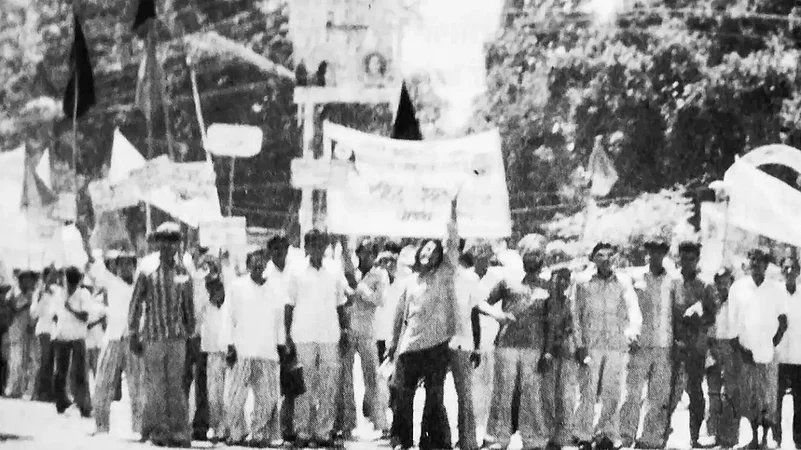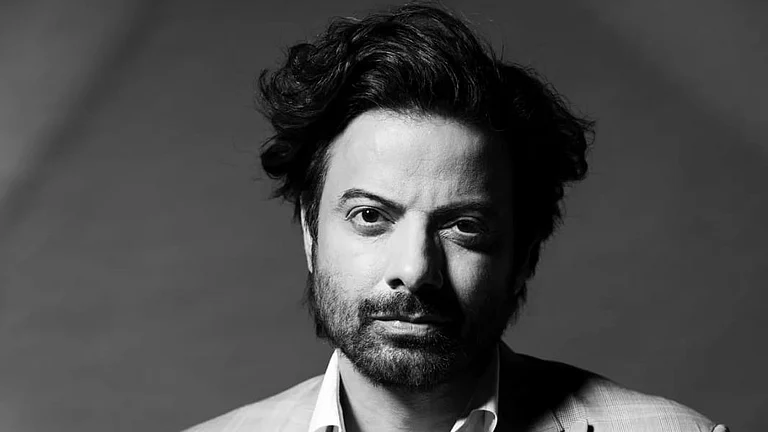In 1973, a person named Gian Chand, a civil hospital employee, was brutally killed while in police custody in Masani village in Phagwara district of Punjab. A group of students from Ramgharia College, who had formed an organisation called the Students’ Socialistic Federation (SSF), gathered outside the police station to protest against the incident. Santokh Lal Virdi, 19 then, was the district secretary of the organisation.
After a year, during a protest against the brutal killing, when the students gheraoed Gurmail Singh, the then education minister of Punjab, an officer from the Crime Investigation Department (CID) questioned a fierce Virdi which organisation did they belong to. He uninhibitedly responded, “Dalit Panthers”. At the time, he was not even aware of what Dalit Panthers implied except that the social organisation fought against injustice.
Virdi ended up dedicating his entire life to fight against caste oppression that he had been a witness to since he was a little boy. An advocate and an activist, Virdi is known for his anti-caste struggles. A writer of as many as 40 books and more than 300 articles addressing caste discrimination, he, at the ripe age of 69, is considering returning to activism.
The Beginning
Virdi was born on September 20, 1954, in a village named Birkaan near Phagwara, Punjab. Born in a Dalit family, he endured caste experiences right from his childhood. He experienced discrimination at school where his elementary school teacher Master Pargan Singh would thrash him and his other Dalit classmates, hurl casteist slurs at them and throw them out of the school. They were treated with contempt while working after school hours. They were forced to bring their own utensils, served food like animals and compelled to drink water from ponds from which animals would also drink.
Doaba—a region in Punjab that lies between the Beas and Sutlej Rivers—had been the hub of Dalit politics at the time. Virdi’s father would take him to various events organised by Dalit activists around the city. One such event was an annual cultural fair organised in the Chak Hakim village in Phagwara to commemorate the death anniversary of Guru Ravidas.
Workers from Samta Sainik Dal (SSD)—a social organisation founded by Ambedkar in 1924—would also join this event in large numbers. Leaders of all political parties used to partake and deliver speeches during this fair. Communists would stage plays at night. Ajit Kumar Phulka, a leader of the Republican Party of India (RPI), used to visit his village frequently. He would gather the children, narrate stories of Dr Ambedkar and rally them around the village. This largely stirred Virdi to contextualise the subjugation of the Dalit community and paved the way for activism.
The Changemaker
Owing to the harrowing experiences he witnessed in his village—how women of his community were sexually abused by the landlords of the dominant castes while working in the fields or at their homes and men were exploited and routinely humiliated—he vowed to refrain from a private life and devote his entire life to end oppression and discrimination. In order to commit to it, he decided not to engage in familial relations and that he wouldn’t accumulate any private property. He engrossed himself in fighting injustices and working towards social transformation.
After he and his comrades mentioned Dalit Panthers during their protests, activists and leaders of the organisation from Bombay visited Punjab to constitute the state unit. Virdi was made the Punjab state convener and a member of the national executive committee. Later, he was invited to the national council meeting of Dalit Panthers organised in Delhi in 1974. He was merely 20 then. During his stay in Delhi, Dr Ambedkar’s personal assistant, Nanak Chand Rattu, invited Virdi to stay with him. They talked about Ambedkar and his efforts to uplift the community. He also met D C Ahir and was profoundly influenced by him.
As a member of Dalit Panthers, he took up several issues. From struggling to put an end to casteist practices perpetuated through religious scriptures, campaigning against superstitions, raising a demand to have more share of crops for siris (landless agriculturists), working towards abolishing the practice of untouchability, to waging a war against the practice of separate place for langars (community kitchens) for Dalits—the organisation addressed several issues faced by the Dalit community. He also struggled to put an end to the evil practice of bulava (being called) where Dalit women were called to collect leftovers from the dominant caste households during which they were taunted and sometimes inappropriately touched.
Soon, Virdi became an object of hatred in the eyes of reactionary sections like dominant caste landlords and priests. He had to face various hardships and was even called a Naxalite. He was tortured in police custody during the Emergency in Punjab, which left his right eye damaged permanently. He resumed activism after the Emergency; spent a year outside Punjab during which he lived at various places in Delhi, Bhopal and Bombay. Subsequently, he took admission in a college in Meerut to pursue law and managed to pay the fees by driving a rickshaw.
Literary Contribution
His literary contribution to the Dalit community is immense. He started writing at a young age and even now he writes to raise awareness on caste issues. He wrote his first play when he had barely passed the eighth standard. The play was titled Bheem Drama, based on the life of Dr Ambedkar, and was staged at the city square. His first article was titled Shaadi Ajj Barbaadi, published in Ravidas Patrika. His prominent works include Punjab da Dalit Itihas (Dalit History of Punjab) and Bharat da Dalit Itihas (Dalit History of India). In Dalit Yodhe (Dalit Warriors), he compiled the life sketches of various women and men who struggled against caste oppression in their lifetime.
His other books include Ambedkari Falsafa (Ambedkarite Philosophy), Budh Dhamma, Dr Ambedkar ate Dalit (Dr Ambedkar and Dalits), Dharm, Adharm ate Sach Dharam (Religion, Iniquity and True Religion) and various pamphlets like Reservation: Jati-Yudh (Reservation: Caste-War), Bahujan Mukti Marg (Bahujan’s Path to Liberation), Bahujan Manifesto, Dalit Panthers, Mandal Commission te Samajik Nyaan (Mandal Commission and Social Justice) and Dalit Dastan (A Tale of Dalits). He also published books on Dalit literature titled Nave Manukh di Sirjana da Sahit: Dalit Sahit (Literature of the Creation of New Human: Dalit Literature) and edited a book titled Dalit Sahit ate Sabhyata (Dalit Literature and Civilisation). He sent his memorandum to the 2001 World Conference against Racism (WCAR), also known as Durban Conference, which was published as Casteism: The Eighth Worst Wonder.
Dalit Panthers in Punjab also organised the first Dalit Cultural Festival on April 14, 1978. They displayed exhibitions and organised declamation competitions on Dalit figures. In 1994, Dr Babasahib Ambedkar Vichar Manch (Dr Babasahib Ambedkar Discussion Forum) organised the first Punjabi Dalit Literary Convention. Virdi was its convener. They passed a manifesto on Dalit literature in this convention citing its aims, which were, to end the exploitation of humans by humans; socially, against casteism and communalism and against any kind of discrimination based on birth, race, gender etc; economically, against feudalism and capitalism; politically, against imperialism and fascism; and culturally, to end any kind of phoney, oppressive and exploitative culture. To achieve this, it aimed to wage a holistic ‘war’ and stated that this ‘war’ will continue till human sorrow, pain and exploitation does not end.
Virdi also constituted the Ambedkar Buddha Marx Learning Centre, which would hold discussions every Sunday. It organised a seminar in March 1984 on ‘What is Ambedkarism?’ They would also celebrate days like Ambedkar Jayanti, Labour Day, etc.

Return to activism
Virdi has travelled across the world carrying with him the monumental experience of struggles against caste oppression. These days, he devotes all his time to publish books on caste issues. He is recovering from a surgery and is hopeful of resuming his work soon after. He says that along with writing, he would also take up activism to inspire the succeeding generations to do justice to the rich and invaluable legacy of the activists of his generation. He shares his concerns that the present generation is not able to address the concrete forms of caste in the contemporary situation, but, at the same time, is hopeful that there is a huge dissemination of caste consciousness that would pave the way for the liberation of the oppressed. He sees hope in the fact that some communist groups are seriously engaging with caste.
When asked how he envisions the struggle now, he stated that one must work towards three kinds of revolution. One would be to mitigate all forms of superstitions that have hampered scientific temperament and rational thinking. The second would be to promote inter-caste marriages that would help to annihilate casteism. He argued that only after accomplishing the first two revolutions, the liberation of the society would be possible.
He takes pride in the fact that he hasn’t splurged any money on building a fancy house or leading a lavish life. His humble house is a reminder of how profound his ideas are. Despite the fact that both his sons as well as daughters-in-law are magistrates, Virdi and his wife Banso Devi, who was a lecturer in Political Science, live modest lives, free from any pretense. They have a separate arrangement for visitors in their house in Phagwara, which can accommodate at least 10 guests at a time. The couple welcomes guests irrespective of their background. The only condition is that the guests must be progressive in their outlook.
This profile would be incomplete without the mention of the contribution made by his wife. While Virdi has been active in advocacy for Dalit rights, his wife had been single-handedly raising two sons and managing the entire household ensuring that he could commit himself to it. She is not only his biggest supporter but also partakes in the process of publication of his books. She herself has written a book titled Bharti Aurat di Dastaan (A Story of an Indian Woman).
(This appeared in the print as 'Invaluable Legacy')
Dr Monica Sabharwal is Assistant professor, Department of English, Punjabi University, Patiala





















